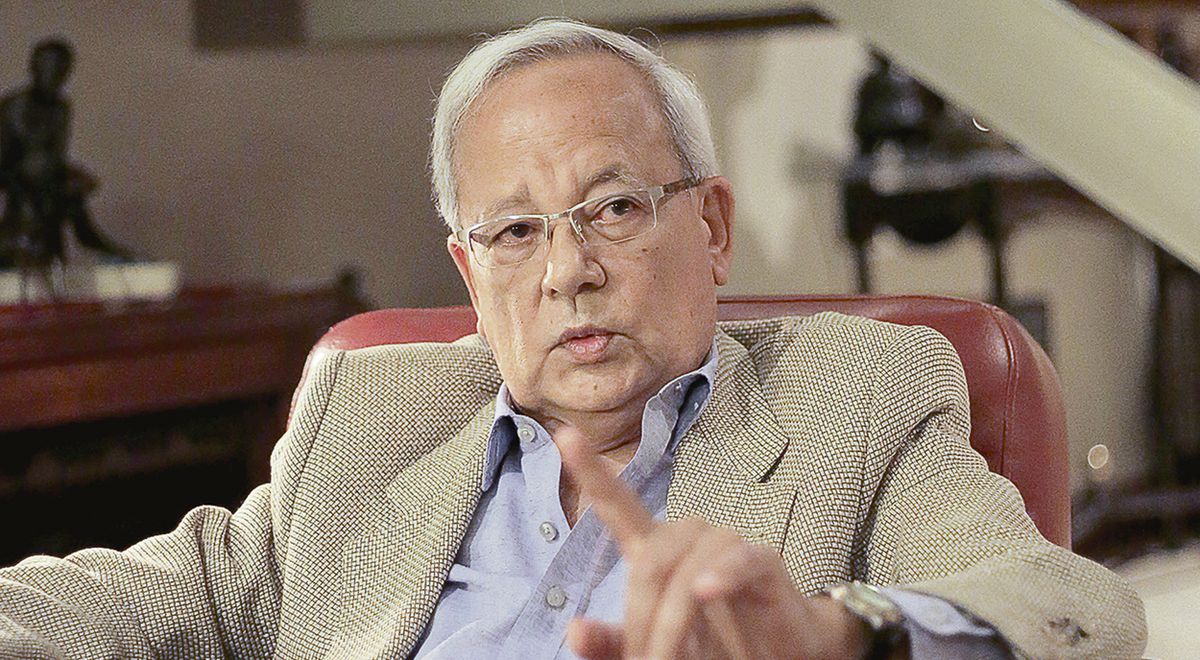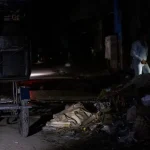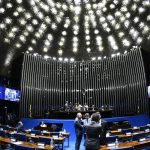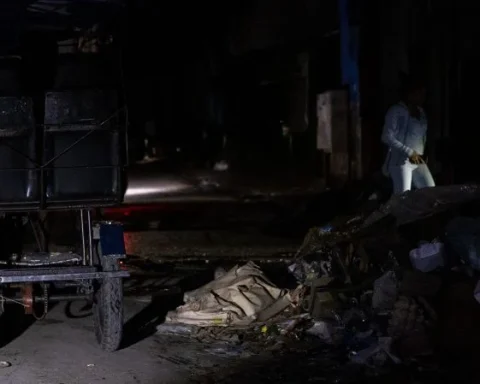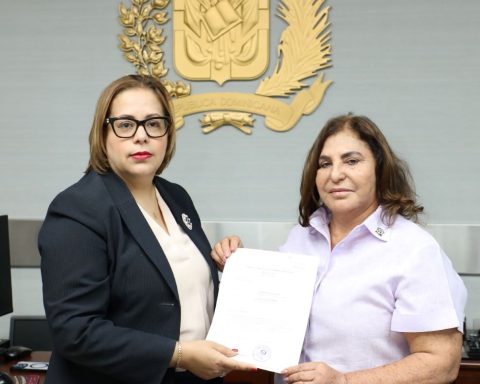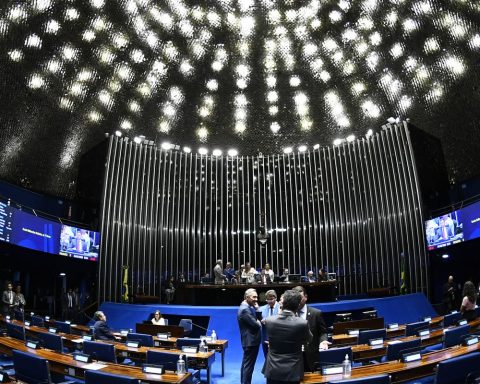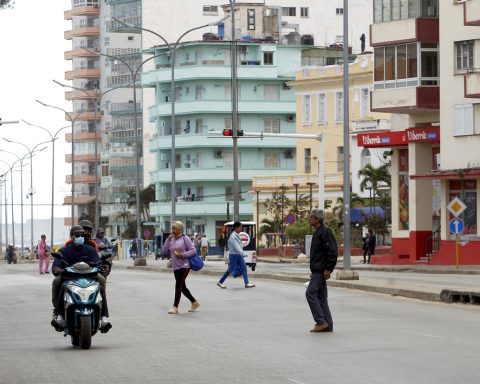In this interview –between current affairs and history– Caesar Hildebrandt offers his reading of the complicated moments that Peru is going through. He points out that we are between an “inept government, confused and handcuffed by its mistakes” and a Congress “dedicated to adopting the reactionary reforms that lobbyism imposes on it.”
A kind of truce between powers was announced. My impression is that –in reality– this confrontation is nothing more than something performative, almost theatrical, discursive. Executive and Legislative have similar agendas, counter-reforms. Don’t you think they are more alike than they are different?
Perhaps they have affinities in terms of the counter-reform agenda, but what is notorious is that Congress wants to vacate Castillo, replace it because he does not feel represented in his figure. It is a guerrilla war rather than a cold war. They are not going to give up their efforts and Castillo is not going to change his obscurantist style too much either, so it is a very brief, fragile, tactical, not strategic, truce that is going to end in a confrontation that I consider inevitable.
What kind of confrontation?
It’s a fire and the logs are put by Castillo. And the pyromaniac desire is put by Congress. There is a concert of wills for the fire. And the public attends to that.
YOU CAN SEE: Restart of an alliance sealed in the Government Palace
Do you subscribe to the “everyone go”? Or would it be better for the country if they agreed on a minimum agenda and left office in 2026 in the least traumatic way? Or do we not give for more?
This country does not give for more for many years. 2000 was no more, and yet a way out was found. It seemed that there was no more with Merino de Lama and a gray, average, and yet bearable and reasonable output was found by chance. I don’t think the country should endure four and a half more years…
From this.
From this. I don’t think it’s healthy…
Mentally for the people, no.
I don’t think it’s healthy for democratic institutions, the economy is always at risk, or healthy in general for Peruvian society to attend this eternal agony of two failing forces, two discredited ones fighting for a trophy that I don’t know what it consists of. That’s what it’s all about, right? A repudiated Congress, an unpopular president are hunting each other down and the country is on autopilot. It does not seem fair to me to say that the Constitution is an inevitable condemnation that subjects us to the five years of the mandate. New elections may allow us a way out. Look at Chile, an almost Patagonian deputy became president. Of course, the difference is that there are parties.
Indecipherable. Castillo’s decisions are not understood, says Hildebrandt. Photo: Marco Cotrina/The Republic
YOU CAN SEE: Pedro Castillo: When my term ends, I will return to school, to my community
And the differences between the cabinets are noticeable.
The Chilean political class is superior to the one here, not only the cabinet. What we do not want to acknowledge here out of pride, a misunderstood sense of honor, is that we are in an apocalyptic cultural, educational, political, and social crisis.
And do you believe that the political crisis is a consequence of all this cultural, educational crisis?
Yes, of course. There are communicating vessels, that divorce between culture and politics has been decisive for Peru, the bad way. It is one of the worst things that has happened to us. When the intelligence, the culture, the academy fled from politics, then came these wombs for rent, commercial acronyms, these parties of kits, and false memberships…
And signature sheets.
Exactly, and ghostly places. Above all, these parties absolutely dead in ideas, incapable of producing an interpretation, even a primitive one, of the country’s problems.
YOU CAN SEE: The president’s call to the OAS puts the Foreign Ministry in trouble
I read and hear diagnoses that are very severe. The criticisms are justified, although the mood felt in these analyzes is almost national tragedy. I turn to your experience: is the situation so dire if we compare it with previous episodes?
If you think that we had to choose between Keiko Fujimori and Pedro Castillo, you will realize the size of the crisis. A country that offers two candidacies of that lineage in a second round that is already selective, is a country with a deep crisis. No, it is not an exaggeration to say that we are experiencing a dramatic moment. It doesn’t take any Shakespeare to invent a tragedy, there it is. The tragedy is an inept, confused government, handcuffed by its mistakes, and this Congress, dedicated to adopting the reactionary reforms that lobbyism imposes on it. What does this look like? I have to go back to what I have read about Peru in 1894, after the invasion and the defeat and the lost war. The problem is that we seem invaded by ourselves.
Are we ourselves the enemy army?
Yes Yes. There is no national project. That is the eternal gibberish, the little waltz that haunts us. There is nothing that excites people, there is no apparent way out. We live in the permanent impasse, We have put up a tent and we sleep there. We have put the rod of Manco Cápac in the impasse.
Have you ever felt optimistic about Peru? In any episode?
I have been an optimist sometimes retroactive by my readings. I assumed that Manuel Pardo’s Civil Party was going to be an important outlet to build party reforms and others. I assumed that Piérola, precisely because he was not a civilista and belonged to a kind of popular alternative…
And reformist.
And reformist in many aspects could be a solution. It was not. I assumed that the great hero who was Andrés Avelino Cáceres could make an important government. It was not. I figured Billinghurst was going to last longer than the two years it did…
Until the hit.
Until the Benavides and Prado coup, and it wasn’t like that. I assumed that Bustamante and Rivero could be a great alternative, but APRA was in charge of melting that engine and rejoicing in it. I even assumed that the first Belaunde Terry accused of being a communist by Eudocio Ravines, by the newspaper La Prensa, by Pedro Beltrán, could be the great way out of the middle classes that could impose a modernized Peru, but I was wrong and it did not turn out that way. I assumed that Velasco Alvarado could be an extraordinary exit because it was the exit of the armed force, the protagonist of a revolutionary process. There was a lot of hope about it. Velasco’s first two years were resoundingly popular. And yet, everything ended badly and everything was a social and political failure. We end with Morales Bermúdez hunting monteros piece by piece in the center of Lima. I assumed that Alan García, the first, the original, the prophet, was going to be finally –finally, I said–… and I ended up in a queue to buy ENCI milk and finding out after the feast they had had. And I could go on for longer telling you all my…
Disappointments?
Expectations, illusions and my subsequent bitterness. But this situation where a government declares itself almost incapable of governing, I had not seen it. This government with a Congress that wants to behead someone who has already been beheaded, that wants to remove a government that no longer exists, is pure surrealism.
YOU CAN SEE: Pedro Castillo admits having felt discriminated against during the general elections
For example, dispensing with your minister with the best results is something that is not understood. That happened in Health.
It is that nothing is understood. Not only is it that you bring out your best minister, it is that you put the worst substitute. What logic is there in this? sure, then comes Mr. Cerrón and explains to you from his regional sectarianism that it was time for the merits of the field. Actually, it was time for his servants.
The worst thing is that Castillo accepts this imposition.
We have an indecipherable president because after learning how the group around him operates, of the internal memos released by the former secretary general of the presidency, Mr. Jaico, I come to the conclusion that Castillo is not protecting a group: he is part of the group.
Departure. A new electoral process could be an escape route, the journalist reflects. Photo: Marco Cotrina/The Republic
To Pedro Salinas he said: “The center is our salvation.” Why?
For the same reason that my column is called “Shades”, because I believe less and less in binary systems, in exclusive dichotomies, black-white, ugly-beautiful, left-right. There is something military in all this, something simplistic, something naive. The world is much grayer than we would like. An educated center, I’m not saying bookish, but it did come out of reflection and study, it’s wonderful, because in the end the solutions always come from opposing parties, they are very sophisticated combinations. No problem has a solution…
YOU CAN SEE: Pedro Castillo keeps 5 questioned ministers
Only.
Unique, and no problem has only one edge. The problems are more hexagonal than the minister’s water.
It seems to me, this sympathy for the center is more recent in you.
It’s that I feel center-left, if I had to define myself. Socialist and liberal. It is nothing original, it is not an invention, I do not discover anything, because it is an old debate, this matter of a socialism that recognizes the individual as a sacred piece and that, however, admits that the solutions must be collective and, in addition, fair . And what is the other way out? Go back to the tribe, throw spears at us, resurrect the mammoths? That’s where we are. Peru is now a country of caves. They all feel the trustees of humanity and look at others like dangerous Neanderthals. That’s tremendous, isn’t it? 200 years to reach this degree of enmity and virulence? We learned little, right?
It is a society not only at odds. It has a certain degree of savagery.
If the wild is that which grows and develops spontaneously with a certain minimum of rules, we are not really savages. In reality, we are barbarians. I have a possibly romantic and bucolic concept and savagery doesn’t scare me. But barbarism yes, because there is a kind of code and premeditation there. The savage is there, hunting and living. The barbarian is the one who can destroy Rome, the one who bombs the Buddha statues in Afghanistan and, in Peru, the one who says that poverty is necessary because otherwise wages would be too high. That’s another way of being Attila.
YOU CAN SEE: Vote of confidence: Torres cabinet will go to Congress on March 8, confirmed Pedro Castillo
“Journalism has not confronted the system”
You have told me about your disappointments, which Peruvian politicians have you respected?
I greatly respected Andrés Townsend, although I did not share his English conservatism. I greatly respected Bobby Ramírez del Villar, although he did not share his Christian Democratic right-wing. I greatly admired Héctor Cornejo Chávez, despite his character, his tantrums and his attachment to authoritarian solutions, eventually. How not, yes. I have admired many people. I have been friends with many people with whom I have had almost no political affinity. Luis Alberto Sánchez considered me a friend and I considered him a teacher. I have admired Pablo Macera before he became a congressman for Fujimori. Not only do I have the ability to admire, I have a desire to admire, a permanent need to believe in people. What happens is that in Peru it is a very difficult profession to be an admirer, very arduous, a dangerous job.
How long do you plan to practice journalism?
I feel more and more like abandoning myself to my readings. And yet, every time I have this temptation, and I have it more and more often, there is always a side of me that says “selfish, you are thinking about yourself, and not what you do”. But there is another side of me that says “don’t pay attention to that voice, because you’re not doing anything, what you’re doing is useless, what you’ve done was useless, you didn’t correct anything, you didn’t improve anything, you didn’t rectify anything, it is your ego that is at stake.”
Are you disappointed in your journalistic career?
No. But of journalism in general. Journalism has not confronted the system, it has been integrated into it. And that castration has been fatal. There is no journalism without restlessness, discontent and a little anger. And 80% of Peruvian journalism seems to be eternally dancing the minuet of contentment, of resignation, of courtesy. It is the journalism of Versailles.
